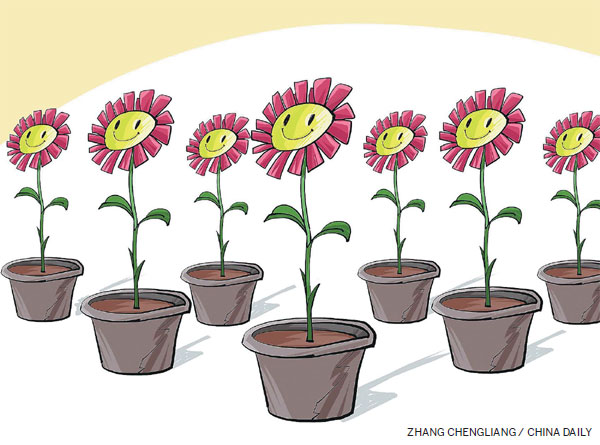Making the spirit of reform normal
Updated: 2015-04-10 07:14
By Giles Chance(China Daily Europe)
|
|||||||||||
New model of growth isn't just about lower GDP, it's about applying change to every aspect of society
China's new normal is a phrase on many lips. But what does it mean, apart from lower GDP growth for the economy? The Lingnan Forum, which took place on March 29 at Lingnan College at Sun Yat-Sen University in Guangzhou, brought together, for a day, a number of well-qualified Chinese speakers, including a senior lawyer, an insurance regulator, the former head of the Chinese banking regulator Liu Mingkang and other well-known figures from Chinese business and academia, to discuss various aspects of the new normal. The audience consisted of Lingnan students and professors, and businesspeople connected to Lingnan through its EMBA programs. The speakers addressed the issue, in their different ways, of how to normalize and continue the development of the Chinese economy following the headlong growth that averaged around 9 percent annually between 1980 and 2010.
At Lingnan's Forum, the new normal meant different things to different speakers. For lawyer Li Shaoping, it meant reform of China's legal system to make it more transparent, better qualified, more inclusive and fairer. For insurance regulator Chan Wenhui, it meant channeling the huge assets of China's insurance companies into the real economy to obtain higher returns and greater profitability, via investments in the shares of Chinese companies quoted on the main Chinese stock markets, and basing insurance regulation on risk assessment rather than direct involvement in day-to-day corporate operations. For Chan Long, of Alibaba's financial subsidiary, it meant providing an integrated banking service via the mobile Internet to China's consumers. For UnionPay, it meant extending the reach of China's consumer banking services globally. For the research department of China's Finance Ministry, it meant increasing the cost of energy, in order to pay for a cleanup of Chinese power generation.

Two speakers were prominent, in my opinion. One was Hu Shuli, the founder and leader of the media outlet Caixin. She addressed the issue of private consumption in China, often described as the key to sustained and balanced Chinese economic growth.
In her view, the key factor here is to encourage the wealthiest Chinese families, who are the biggest spenders and therefore the drivers of private consumption, to spend their money in China, rather than in the real estate markets and shopping malls of Europe and North America. Over 50 percent of disposable income in China comes from the top 5 percent of earners. Of this, probably more than 75 percent is spent outside China. "Earn it in China, spend it outside China" is the motto of China's new rich.
Walking down Fifth Avenue in New York, Bond Street in London, or rue du Faubourg Saint-Honore in Paris, it is easy to see the queues of Chinese new rich outside stores like Saks, Harrods and Hermes. Major hotels and all the luxury department stores in these major overseas capitals now take UnionPay bank cards, used exclusively by Chinese customers. Chinese rich go overseas to spend partly because they want to be sure of buying a genuine product, not a copy. Another reason, they say, is that they do not receive proper customer service in China. Chinese shop assistants are not trained to treat wealthy Chinese customers with the deferential and knowledgeable attention that the rich feel they are entitled to. After all, they can go to another shop next door, so their sense of entitlement is justified.
How long will it take for the Chinese retail and service industry to learn how to put the customers first, and treat them in a way that encourages them to feel good about spending? The new retail sensation in China Taobao is about convenience, not customer service. Here is a revolution in the Chinese service sector that is waiting to happen. Only in foreign-run hotels in China does the guest get that special sense of being cared for, of being the center of attention. Too often in Chinese hotels and stores it is your credit card that matters, but you do not - unless you are an important government official.
The other speaker who stood out was Wang Jun, of the World Bank office in China. Starting his address by saying he had only one month until he retires, he proceeded to criticize the financial system in China for its slow pace of change, pointing in turn at SOE's, local governments and the central government as sharing the blame. But it would have been fairer for him to point out that it is always hard, everywhere, to make fundamental changes, particularly in banking, insurance and other financial matters that involve significant risk. Look at Europe, for example. How much fundamental change in the European financial system have we seen since 2010?

In fact, China's pace of financial reform, which presently focuses on interest rate liberalization as a runup to full convertibility of the Chinese currency, compares favorably with almost every other country. Twenty years ago, the Chinese banking system was essentially insolvent because most of the loans made by it to Chinese state-owned enterprises could not have been repaid. The complete overhaul and modernization of China's banks have led to today's position of banking solvency and profitability (including the overhang of local government debt). That is a remarkable achievement in which the creation of the four bad-loan banks in 1998 and the listing of the largest five Chinese banks in Hong Kong after 2005 have played a key role. Which other country, anywhere, can boast of such a record of fundamental reform in the past two decades as China?
From the variety of different speakers at the forum, it became clear that the new normal in China actually means a spirit of reform, innovation and change, covering not just the economy, but every aspect of life. It applies to education, where it is well recognized that China's educational system is not producing the innovators the country needs to escape the famous middle-income trap into which many once-promising emerging economies have become stuck. How many times has Jack Ma, one of China's most prominent innovators, told us that he failed the Chinese college entrance examination three times? The new normal spirit applies to business, where increasing competition in banking and other industries is forcing Chinese companies to focus on new approaches to developing and delivering products and services. It also applies to government, law, the environment and sports - in short, every aspect of Chinese society.
But the criticism from Wang Jun has a point. Even with a remarkable reform record since 1980, can China meet the challenge of the new normal? A large country like China tends to look inward and to resist change, unlike small island economies like Singapore, Hong Kong and even the United Kingdom, which depend greatly on the outside world and tend therefore to be more open to change and new ideas. The force required to overcome inertia in a large country needs to be even greater. So far, though, the signs are that the Chinese government recognizes the size of the challenges ahead. The next five years will be extremely challenging, requiring sustained will and effort from China's leadership. It is a real test. But if China is to take its place at the top table of world leaders, it must be passed.
The author is a visiting professor at Guanghua School of Management, Peking University. The views do not necessarily reflect those of China Daily.
(China Daily European Weekly 04/10/2015 page10)
Today's Top News
Putin backs China's Silk Road proposal
Boston bomber convicted, may face death penalty
Zhou trial likely to serve as model
Belarus to expand trade and economic ties with China
Cause of China chemical plant blast identified
Fleeing war-torn Yemen, Chinese, foreign nationals share the same boat
Liu Xiang expected to announce retirement on Tuesday
Toilet revolution for tourism evolution: Opinion
Hot Topics
Lunar probe , China growth forecasts, Emission rules get tougher, China seen through 'colored lens', International board,
Editor's Picks

|

|

|

|

|

|






